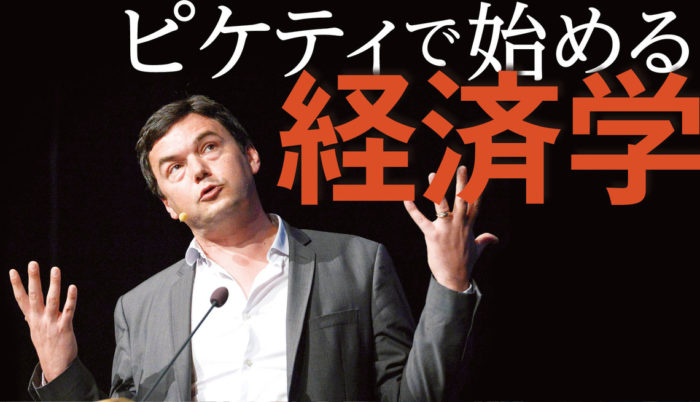Published in the Nikkei Asian Review 3/2/2015
French “rock star” economist Thomas Piketty recently arrived in Japan to a reception that was the academic equivalent of the frenzy over the Beatles at the Budokan in 1966. His plump features stare out from TV screens, magazine covers, phones and I-pads and bookstore displays. The Japanese version of his magnum opus Capital in the Twenty First Century has sold 130,000 copies in its first two months and ranks fifth on Amazon Japan’s best-sellers list.
Naturally there has been much interest in the great man’s thoughts on inequality in Japan. Here he has both good and bad news for Prime Minister Shinzo Abe. Piketty is an enthusiastic proponent of reflation and approves of the Bank of Japan’s aggressive policy of quantitative easing, indeed believes the inflation target should be 2-4%.
On the other hand he dislikes the regressive nature of consumption taxes and slammed last spring’s hike in the rate from 5% to 8% which drove the Japanese economy into recession. His main policy proposal is for progressive taxes on wealth itself, globally enforced if possible, and redistribution to young, asset-poor workers and job-seekers.
Piketty has been widely praised for shining a light on the topic of inequality in the advanced economies and amassing data on income and wealth distribution spanning over 200 years. On the other hand his core thesis – that capital always compounds up at a greater rate than economic growth, which means that the rich must inexorably grow even richer over time – has met with scepticism on both empirical and theoretical grounds.
Two prominent economists, James A. Robinson of Harvard University and M.I.T.’s Daron Acemoglu, have taken Piketty’s analysis to task, arguing that historically there is no correlation between inequality and the relationship between growth and return on capital. Piketty, they assert, neglects the role of policy, institutions and technological change in influencing the distribution of wealth. Larry Summers points out that the proportion of the Fortune 400 wealthiest Americans who inherited their wealth is in sharp decline. According to Summers, it is the widening gap in income differentials that drives inequality today, not return on capital.
EGALITARIAN JAPAN
Japan’s own experience challenges the Piketty thesis too. The large increase in the “precariat” – low-paid workers on part-time contracts – has come at a time of shrinking, not rising return on capital, to the extent that 10 year bond yields have fallen well below the expected rate of inflation. Despite the rise in income inequality, wealth inequality in Japan is low by international standards. According to a recent study by Credit Suisse Research Institute, the proportion of wealth held by the top 10% was the second lowest of the 48 countries surveyed and far below supposedly egalitarian Scandinavia. Another study, this time by Global X, finds there are more billionaires in Ankara than in the whole of Japan.
Japan’s relatively flat distribution of wealth arises not from some deep cultural orientation, but from the devastating declines in the asset markets of the past twenty five years. Wealth, far from compounding up, was destroyed. Real estate magnates who were amongst the richest men in the world on paper in 1990 were out of business by the end of the decade. Companies in the global top fifty by market capitalization disappeared off the radar screen in rapid succession. By contrast, small savers, particularly the elderly, saw little change in their wealth and even benefitted as the economy slid into deflation and the purchasing power of cash steadily grew year by year.
Bear markets are nature’s way of redressing inequalities of wealth. That is what happened when the Japanese bubble burst and there are warning signs of a similar phenomenon globally today as interest rates slide to levels not seen for centuries. In these conditions capital will compound up slowly, if at all, and the sky-high valuation of prime real estate and other trophy assets across the world offers an unattractive combination of risk and reward. Growing your wealth is getting much harder.
MUCH BOUGHT, LITTLE READ
Japan is hardly alone in experiencing a Piketty boom. Capital in the Twenty First Century has sold over a million copies worldwide and is being translated into 30 languages. Note, though, that according to data from Amazon, which monitors such things through its Kindle network, Piketty’s tome was also the “least read” bestseller, with the average reader getting through just 2% of the text. Even so the widespread aspiration to read 700 pages of dust-dry economic analysis is revealing. From Beijing’s campaign against graft to the rise of European populists and President Obama’s proposal for higher capital gains taxes, there are signs of a shift in the global zeitgeist as political systems struggle with the issue of inequality.
In their critique of Piketty’s “iron laws” of economic history, professors Robinson and Acemoglu describe how the era of “robber baron” tycoons in late 19th century America was followed by the era of trust-busting. “Popular mobilization,” they write, “triggered in part by the increase in inequality, changed the political equilibrium and the regulation of industry.”
It would be ironic if Piketty’s work helped trigger a similar change in the political equilibrium in today’s world, thereby invalidating his own predictions.
